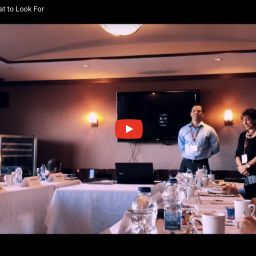SEO Trends
In a previous video I gave an introduction to the basics of SEO. I demonstrated how many small business owners do not consider SEO when developing their web presence. In today’s video, I delve a little bit deeper into SEO and give the facts about how Google indexes websites and the top 3 factors that website owners need to take into consideration concerning SEO.
Links, Content and RankBrain. If you do nothing else, focus on these three items. And ultimately, if you only focus on the first two, and include locality metrics, the RankBrain aspect will take care of itself.
How does RankBrain affect my SEO Strategy?
In this short video presentation I provide an SEO Periodic Table provided by Search Engine Land in order to support the latest theory that the 3 most important SEO factors for websites today are Links, Content, and RankBrain (ultimately local optimization combined with the first two).
Below you can view the slides that I used during the presentation. This is only a birds-eye view and I will delve deeper into SEO in future videos so be sure to subscribe to my YouTube channel: https://bit.ly/2QkzsJ5
Soon after I moved to Montreal I saw HUGE potential for businesses. I helped one local small business that had been in business for 30 years grow 400% since 2012 and unit volume sold by 800%. That growth isn’t the norm, but like them, many small businesses around Montreal still have not taken advantage of the full power of Google and website SEO to fully realize the power of the web.
How can I build my website’s SEO?
In the video above, I explain the steps that every business owner can take to build their website’s SEO. However, don’t think of it as your “Website’s SEO,” think of it as your Page’s SEO. Each page on your website has the potential to rank high and each page on your website has a different page rank. Here are the steps to make sure your page ranks higher than your competitors.
- Structure. Make sure your page has 1 H1 Heading only. The H1 Heading tells web crawlers (spiders) what that page is about. It’s the main heading of the page.
- Meta Description. Each page has a meta description. This is the metadata that tells the crawlers what the page is about. Make sure it coincides with your H1 Heading.
- H2 Headings. Include at least 2 H2 Headings to break up your content into human readable form. Having an H3 or H4 Heading below each H2 Heading is useful as well.
- Keep in mind RankBrain. RankBrain is a machine learning or “AI” algorithm that is part of Google’s overall algorithm for ranking web pages. Combined with the other parts of Google’s algorithm it helps to display relevant results to end users. “Keywords” are pretty useless these days. It’s “Key Phrases,” Synonyms, intended information, and inference that are now getting the juice. Sometimes people search for things, but the search phrases they use are not close to what someone with “common sense” would use to search for their intended result. Google has some pretty smart people working for them 🙂 and they know what you “intended” to search for. Keep that in mind when writing content.
- Finally, after you’ve written your great content and you’ve made your informative videos, ask for links to that web page from authoritative websites. Share your content on social media.
References
Cisco Stats: https://bit.ly/2wmdZJb
SEO Periodic Table: https://selnd.com/seotable
Google Factors: https://selnd.com/2yz700K
If you’re business is in need of SEO work, please contact us today for a free review of your site and online presence. There’s no obligation and we will be straightforward with you about any deficiencies and whether or not we can help.



